June 21, 2019 Leave a Comment
Pacifiers have been at the center of countless arguments. Amidst all this confusion, parents still want to know: Should I give my Baby a Pacifier?
Of the many things that regularly form the center of parenting arguments, one of the oft-repeated ones is regarding the pacifier. Also referred to as a soother, dummy or binky, this little object has a nipple, a shield and a handle. All these may be separate parts attached together, or a single piece.
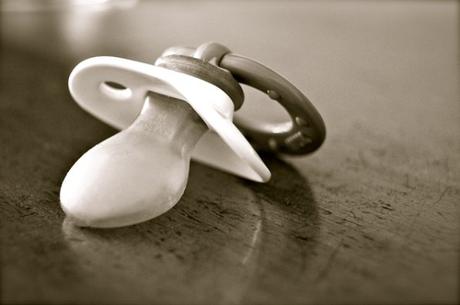
Before we get into the controversy part, let’s look at why pacifiers are so popular in the first place. The main reason is the sucking reflex in babies. Babies suck their thumbs or fingers even before they’re born, and while the main reason for this reflex is the need to feed, even babies who are full may want to suck for the satisfaction of it. While this is the underlying logic behind pacifiers, parents around the world offer it to their babies for several different reasons.
Reasons parents give their baby pacifiers:
- To soothe their baby whenever they get cranky or fussy
- To offer comfort during stressful events like vaccinations, doctor visits or visiting strange places
- To help baby fall asleep on their own
- To offer relief for babies with colic or reflux
- To help babies overcome the discomfort of air travel
- To help babies wean off the breast
- Because they consider pacifier addiction easier to break than thumb sucking
Now, coming to the all-important question:
Should I give my Baby a Pacifier?
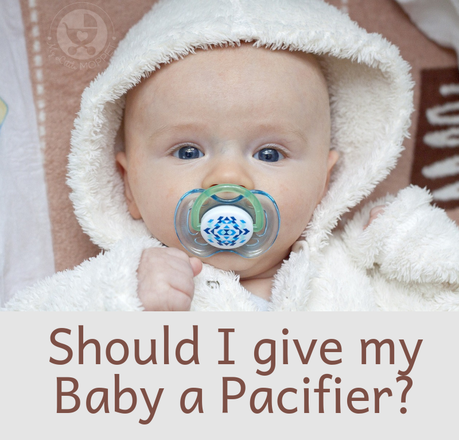
As with all parenting topics, there are multiple sides to this one too, but if you were to ask me for the answer in a single word, it would be this – NO.
The American Academy of Pediatric Dentistry says that due to continued sucking on the pacifier, “the upper front teeth may tip toward the lip or not come in properly. Frequent or intense habits over a prolonged period of time can affect the way the child’s teeth bite together, as well as the growth of the jaws and bones that support the teeth.”
The British Dental Health Foundation says, “avoid using a dummy and discourage thumb sucking. With prolonged use, these can both eventually cause problems with how the teeth grow and develop. And this may need treatment with a brace when the child gets older.”
Giving a baby a pacifier is encouraging non-nutritive sucking, and this can lead to several problems. Here are some of the main ones.
1. It creates nipple confusion. When young babies are introduced to pacifiers while they are getting the hang of breastfeeding, it can create nipple confusion. This can lead to babies rejecting the breast, despite all the mother’s efforts at getting the latch right. This might cause parents to give up trying to breastfeed and resort to formula, missing out on valuable nutrients.
2. It reduces milk supply. In order to establish a proper supply, the mother’s breasts need proper stimulation, especially during the early days of breastfeeding. However, when the baby gets her sucking fix from a pacifier, the breasts lose out on this stimulation, resulting in a lower milk supply.
3. It causes early weaning. Once babies start solids and are able to satisfy their hunger from sources other than breast milk, they won’t need the breast since they have their pacifiers to satisfy their sucking reflex. Studies show that babies who regularly use pacifiers don’t ask for the breast as often, eventually giving it up sooner than other babies who don’t use pacifiers.
4. It lowers weight gain. Sucking takes energy, whether it’s from a breast or from a pacifier. The difference is that when sucking at the breast, they can make it up with calories in breast milk, but sucking from a pacifier is just expenditure of calories with no intake. This can cause weight loss in babies, especially as they don’t have as much of an initiative to suck at the breast after being with the pacifier all day.
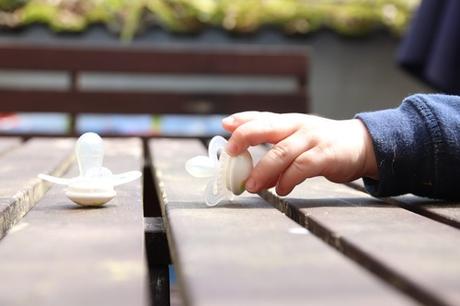
5. It can expose the baby to germs. Pacifiers frequently fall out of babies mouths, which they pick up and pop in their mouth again. This can lead to transmission of all kinds of germs. Besides, older kids may play around with the pacifier, further exposing it to germs.
6. It can lead to addiction. Just like thumb sucking, pacifier addiction can also be a hard one to break, especially if the baby is dependent upon it to sleep. In such cases, the baby might wake up whenever the pacifier falls out and may start crying for getting it back in.
7. It can cause infections. Babies who use pacifiers may be more susceptible to fungal infections like thrush, which gets passed between mother and baby. Besides this, studies have found an increased risk of middle ear infections in babies who use pacifiers regularly.
8. It can lead to dental problems. Using the pacifier for a long time can affect the development of the child’s teeth and jaw. When sucking, the jawbone is pulled forward, and this can lead to misalignment of teeth. In more serious cases, it can affect the shaping of the soft palate causing speech problems.
9. It can be a choking hazard. Pacifiers that are made of multiple parts can be a choking hazard if they separate. Also, if the child bites on the pacifier and breaks off a piece, it can choke the baby. If the pacifier is given right after medicine, it may case the pacifier material to disintegrate.
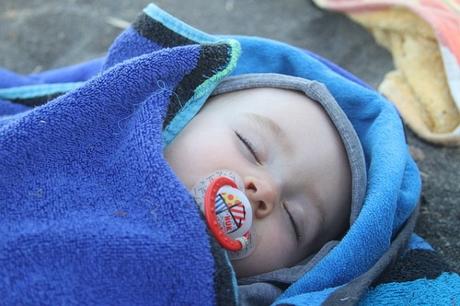
Looking at the reasons listed above, it’s clear why pacifiers aren’t recommended for babies. However, there are a certain cases when a pacifier can be helpful. For instance, premature babies who are away from their mothers may benefit from sucking on a pacifier. Sucking on a pacifier can also ease pressure buildup in the middle ear during flights, which can be very uncomfortable for young babies.
At the end of the day, it is up to the parents to decide whether to use a pacifier or not. If you do plan to use one for your baby, consider the following do’s and don’ts.
Do:
- Wait till the baby is properly settled into a breastfeeding routine and the mother’s milk supply has been established. This usually happens around 6-8 weeks.
- Offer the only between feedings so that it doesn’t affect baby’s appetite.
- Try to restrict giving the pacifier only at nap time and bedtime.
- Use a pacifier that is BPA-free.
- Replace pacifiers every 2-3 months
Don’t:
- Jump for the pacifier at the first sign of distress. Try other solutions first, like feeding, rocking or carrying the baby.
- Dip the pacifier in juice or other sweet drinks – it can harm baby’s teeth.
- Use pacifiers that have cracks or breaks.
- Tie the pacifier around the baby’s neck – it can cause strangulation.
- Offer it to a baby who is struggling with weight gain.
If you are offering your baby a pacifier purely to satisfy a sucking need, it’s much better to opt for breastfeeding. The breast is the best and most natural pacifier, and does not have any of the cons listed above. It’s also the perfect way for Mommy and baby to bond, which no pacifier can provide!
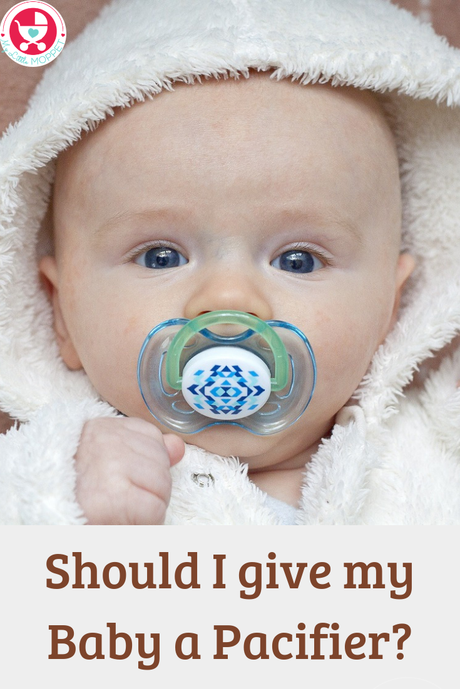
Organic · FSSAI Certified · NABL Lab certified Buy Sprouted Sathumaavu Health Mix powder for Babies / Homemade Cerelac Dry Fruits Powder for Babies/Toddlers Pancake Mixes for Toddlers TweetPinShare+1WhatsAppEmail
Filed Under: Baby, Baby health, Dental Health, Parenting Tagged With: babies, baby care, baby health, health, pacifier, parenting, parenting tips
